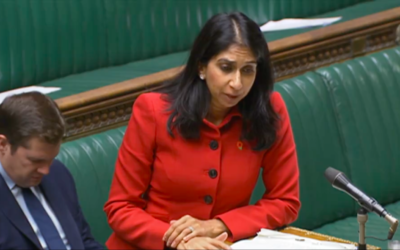OPINION: Beware, Suella Braverman – the language slip is the devil’s way in
Olivier award-winning actor Elliot Levey writes that by employing the linguistics of intolerance, the home secretary damns herself like the protagonist in his new West End show.
Every night I’m told it was the Jews’ fault they inspired such hatred among the German population and had to be exterminated. It could be worth saying at this point that I’m in a play and these words are on the lips of an SS officer, but it gives me the momentary right to break ‘Godwin’s law’ – the first person to make a Hitler comparison loses the argument – and call out Home Secretary Suella Braverman’s recent rhetoric for what it is. Not an echo of Nazi language or a simulacrum, but the thing itself.
If the intention is to dehumanise then it is entirely appropriate we classify it correctly and recognise, as CP Taylor does in our play Good, that fascism grows in increments.
Our show ends in Auschwitz but begins with a tiny slip of the tongue. Our protagonist starts to synonymise ‘Jew’ with ‘capitalist’ and his descent into the abyss begins. It’s a retelling of the Faust story – Mephistopheles arrives in the form of Reichsleiter Philip Bouhler – the man in charge of the Nazi Euthanasia project T4 – but the deal our hero makes with the devil is essentially one where base instincts are given precedence over better judgment – it’s an examination of the morality of feeling over thought.
There’s nothing quite as destructive as a middle-aged man in thrall to his own sexual arousal and need for professional validation. But if the thin end of the moral wedge in our story is frustration at a mother’s dementia and a wife’s depression, the fat end is the implementation of state sponsored murder. It is a chilling watch. And however hyperbolically absurd it sounds when we compare modern political statements to Nazi rhetoric, the moral link can’t be ignored. The similarities are almost knowingly potent.

If we allow ourselves to be seduced by the beguiling atavistic stuff – the stuff that feels right because it flatters us with the simplicity of its seeming pragmatism – economic migrants are a threat to our resources or culture then the ‘Reductio ad Hitleram’ argument is not a fallacy.
Playing the Nazi card – traducing an opponent’s argument because it sounds a bit Nazi – cannot always lose you the argument or there would be nothing to learn from the events that led to the Holocaust. If we use language to demonise, dehumanise and ‘other’ people seeking refuge here, we must accept the linguistic precedents.
Victor Klemperer, the German Jewish academic now best known for his diaries (if you read only one book on the Nazis make it this), also compiled a journal of the Nazi’s use of language. It later became a book, LTI – Lingua Tertii Imperii – language of the third Reich’ and it couldn’t be more chilling for today’s reader.
The shock isn’t that the Nazis indulged in the deliberate abuse of language for terrifying political ends, but that liberal society, although initially derisive, started to use it. Absorb it. Where mockery was the first response and elision into ironic quoting followed, it resulted in not noticing it at all.
The ‘language slip’ is the devil’s way in. It is the wedges thinnest edge. And the framing technique in Klemperer’s Nazi Linguistics – the association of two different things to strip the object of pity – Jews compared to rats, and refugees to natural disasters – tsunamis and floods – makes our reluctance for comparisons feel timid. ‘Godwin’s law’ may lose the argument online, but in life it seems suddenly shackling.
Elliot Levey, David Tennant, Sharon Small, and Dominic Cooke discuss Good in the West End
When a government calls migrants an ‘invasion’ I think we are free to let rip. But Braverman’s brazen hate speech shouldn’t inure us to the subtler euphemisms regularly on the tongues of our leaders – language knowingly deployed to incite animus – and just as likely to be absorbed by liberal society today as it was in Nazi Germany.
If you haven’t baulked at variations on a theme of the ‘Luftmensch’: North-London-citizens-of-nowhere-cultural-Marxist-global-tofu-elites etc, then you’ve swallowed their linguistics whole. The Nazis knew that these rootless creatures of the air were ready to be made into ash.
And their language endures. Do we really need reminding that the linking of a people to a problem requires a solution? Endlosung – the “final solution” – maybe the apotheosis, but how many of us have removed the inverted commas? Appropriate their terms and we absorb their hatred.
Let us be cautious with their ‘Immigration Problem’. I’ll be sticking with the inverted commas – grammatical surgical gloves – handling toxic matter.
Do we really need reminding that the linking of a people to a problem requires a solution?
And what about the poetic end of Nazi euphemism? ‘Kristallnacht’, for example – the anniversary of ‘ the night of broken glass’ was this week– is the focus of much of our play – but the word allows the listener to hear the delicate sounds of tinkling glass rather than the soundtrack of reality: It was a pogrom. That’s the sound of teeth on concrete. Boots on balls.
Klemperer observed that the Nazis sought to embed the hatred of the Jews by ensuring that the difference between Jews and non-Jews was a fixed construct in the mind of the population.
Compensation was impossible and the perpetuation of the division legitimises it. And that’s the strangest element of Braverman’s rhetoric. The idea that today’s migrants will always be aliens. ‘Invaders’ rather than soon-to-be citizens. A forever-burden instead of a potential benefit.
But in employing the linguistics of the Third Reich, she damns herself like Faust or the protagonist of our play. Attempting to frame these people as enemies, knowing the repetition of the phrase in the media – regardless of the disagreeability of view – will establish the link in our minds and allow the association to become an idee fixe, is an abhorrence.
History teaches us it can take generations to dissolve.
For me, however, perhaps the most salutary warning from Klemperer is that there is an often-overlooked element to much of the language of the Nazis. Victimisation, ostracism, alienation, are dialectic. They knit both parties to each other. The oppressed need an oppressor. In dehumanising the desperate people on these boats, Braverman dehumanises herself.
She dehumanises us all. That is not good.
• Good is at the Harold Pinter Theatre until 24 December. Book your tickets HERE

Thank you for helping to make Jewish News the leading source of news and opinion for the UK Jewish community. Today we're asking for your invaluable help to continue putting our community first in everything we do.
For as little as £5 a month you can help sustain the vital work we do in celebrating and standing up for Jewish life in Britain.
Jewish News holds our community together and keeps us connected. Like a synagogue, it’s where people turn to feel part of something bigger. It also proudly shows the rest of Britain the vibrancy and rich culture of modern Jewish life.
You can make a quick and easy one-off or monthly contribution of £5, £10, £20 or any other sum you’re comfortable with.
100% of your donation will help us continue celebrating our community, in all its dynamic diversity...
Engaging
Being a community platform means so much more than producing a newspaper and website. One of our proudest roles is media partnering with our invaluable charities to amplify the outstanding work they do to help us all.
Celebrating
There’s no shortage of oys in the world but Jewish News takes every opportunity to celebrate the joys too, through projects like Night of Heroes, 40 Under 40 and other compelling countdowns that make the community kvell with pride.
Pioneering
In the first collaboration between media outlets from different faiths, Jewish News worked with British Muslim TV and Church Times to produce a list of young activists leading the way on interfaith understanding.
Campaigning
Royal Mail issued a stamp honouring Holocaust hero Sir Nicholas Winton after a Jewish News campaign attracted more than 100,000 backers. Jewish Newsalso produces special editions of the paper highlighting pressing issues including mental health and Holocaust remembrance.
Easy access
In an age when news is readily accessible, Jewish News provides high-quality content free online and offline, removing any financial barriers to connecting people.
Voice of our community to wider society
The Jewish News team regularly appears on TV, radio and on the pages of the national press to comment on stories about the Jewish community. Easy access to the paper on the streets of London also means Jewish News provides an invaluable window into the community for the country at large.
We hope you agree all this is worth preserving.






















